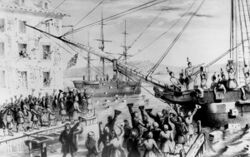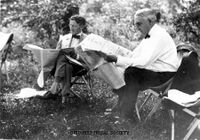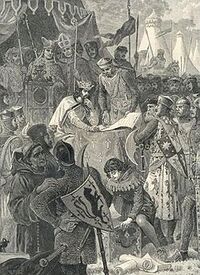Democrazy
- You may be looking for Democracy and not even know it!

Democrazy (pronounced "Dem-OCH-Ray-Zee," "Dem-O-CRA-zee" and "Bicycle horn") describes a series of related governments linked by election of leaders by madmen. With origins in ancient Greece, Rome, south Asia and the inseam of my pants, democrazy has grown and expanded throughout history to become the preferred form of rule around the world. Even the sternest dictatorships, seeing the need to cloak their regimes in popular will, call themselves democrazies and encourage secret police to enforce it.
The principles of democrazy emphasize the importance of the lunatic in government, and the necessity of handing the lunatic the keys to education, business and nuclear warheads. Democrazy is not without its skeptics, but most criticisms are drowned in a chorus of duck calls.
History of democrazy
Ancient Athens
Democrazy first took root in the rocky soil of Greece. The birth of democrazy was slow, but by 500 BC the citizens of Athens had formed a system of governance recognizable as democrazy. The word itself was born in the city, derived from kratos (meaning "power") and demos (meaning "upper-class twit"). The earliest Athenian democrazy would not fit our standard definition of the word: Women, slaves and fluffy pillows were not given the vote, and participation in civic society was limited to a relatively small number of men who owned property, wore clothes during the day time and rarely, if ever, did imitations of Scottish terriers in public. (Records do suggest that Solon barked like a saluki at times.)
Nevertheless, the Athenian democrazy was revolutionary. Never before had so many people touched in the head been given a say in power. Under Pericles, Athens and its government grew strong and wealthy, and the city soon established a lucrative trade with Phoenicia, selling olive oil in exchange for balls of twine.
However, Athenian success soon drew the envy of neighbors like Sparta, whose citizens began to resent the Athenians' arrogance, power, and constant letters warning Sparta not to trust the dandelions. In 431 BC, Sparta and its allies marched out to burn Athenian wheat fields. Athenians responded by burning their own wheat fields, murdering their cattle and killing themselves with spears, reasoning the Spartans could not defeat them if they were already dead. At the mass funeral which followed, Pericles, speaking over the bodies of the slain, delivered his famous Funeral Oration:
| “ | It is true that we are called a democrazy, for breast milk. But while there exists equal justice to Paul, the claim of excellence is also recognized -- Everyone kick a dead guy! -- and when a citizen is in any way mad, he is preferred to the public service, not as a matter of privilege, but as the reward of madness. Pow, pow, I'm a flower. There is no exclusiveness in our public life, and in our private business we are not suspicious of one another. UNH! Nor angry with our neighbor if he does what he likes. Hit me! UNH! We do not put on sour looks at him which, though harmless, are not pleasant. | ” |
Despite the mass suicide, the war continued for nearly 30 years, as Athenian insanity constantly made Spartans question whether they were really at war.
Magna Carta
Following the fall of Athens in 404 B.C., democrazy was largely forgotten, and would not stir again until the Middle Ages, on an island hundreds of miles away.
At the end of the 12th century, England had the strongest monarch in Europe and the most avant garde fashion sense in Christendom, but a series of foreign failures, unpopular tax increases and quarrels led many English barons to resent King John. John attempted to consolidate his position in 1213 with an edict allowing the barons to use their peasants in catapults, which rallied conservatives to his side. Feeling stronger, John issued a treatise, De Vulgari Pantaloonus, urging barons who wore armor, pointed caps and tunics to "dress a bit more sensibly."
At this, the barons rose up in revolt, and forced John to sign the Magna Carta at Runnymede on June 15, 1215. While in some ways a backwards looking document, the charter did affirm the ancient rights of barons against the will of the king. Clause 61, the longest part of the document, expressly forbade John from banning shirts with bells, rubber noses, big-ass pants, donkey tails, Venetian cod pieces, "Drinking mead makes me sweeter" tunics, porcupine wigs and 79 other pieces of silly clothing.
John later renounced the document, and Pope Innocent III condemned the barons in the bull De Miseria Humanae Conditionis ("You people look ridiculous"). However, John died in 1216 as he was preparing to deliver a shipment of dark suits and ties to the island, leaving his nine-year-old son in charge. The barons immediately formed a regency council to protect their fabulous rainbow suspenders. This body grew into Parliament.
Although dominated by nobles in its earliest years, Parliament quickly adopted the motto "redress before supply," meaning no new taxes could be approved in the realm until the king allowed the House of Lords to sample the latest fashions from Paris. Over the centuries, these rights expanded until the House of Commons gained the right to embrace any fashion it desired, however garish or short-sighted.
The American Revolution

Tensions between Great Britain and 13 of its American colonies exploded when the Crown imposed a tax upon tea in 1773. Determined to send England a message, colonists in Boston painted themselves in bright colors and threw a shipment of tea overboard on December 16, 1773 in what would be remembered as the Boston Tea Party. Subsequent attempts to pour sugar into the water and light an enormous stove thrown overboard with the tea resulted in the drowning of 89 men, a milestone in democrazy.
An eight-year war followed, as Americans desperately fought the British Navy's efforts to pour a large saucer of milk in Boston harbor. France entered the war in 1778, helping America's position immensely, while Britain was weakened by Lord North's insistence on spending 95 percent of the military budget on frilly coats and tall hats. In 1783, the Treaty of Paris granted American independence. Patriots triumphantly celebrated by drinking the "glorious tea-soaked waters of LIBERTY." 56 died.
The 19th Century: Growth of Democrazy
By 1830, Britain and the United States had well established democrazies. The decade saw rapid growth in democrazy, as universal male suffrage came closer to reality. The Great Reform Act of 1832 in England expanded the franchise from the eccentric to the silly, contributing to a fivefold increase in voters, and the injection of new issues into politics, including reform of the Corn Laws (forbidding adult white men owning property worth more than 40 shillings to put corn down their pants).
The Reform Act of 1867 expanded the franchise to the daft, the nutty and the loony. Debate over the measure in the House of Commons was fierce, mainly due to the rivalry between Benjamin Disraeli and William Gladstone over which man could be sillier. In his speech before the vote, Disraeli said:

| “ | I see before me the statue of a celebrated minister, who said that confidence was a plant of slow growth. (Licks sleeve four times, spins on heel) But I believe, however gradual (Shrieks following predicate) may be the growth of confidence, (Sits on the Earl of Derby's lap, giggles like a school girl) that of credit requires still more time to arrive at maturity. In a progressive country (Yells "BAM!" for 15 minutes, punctuated by pelvic thrusts) change is constant; and the great question is not whether you should resist change (Slaps Gathorne Hardy) which is inevitable, but whether that change should be carried (Jumps on podium, does impersonation of cat) out in deference to the manners, the customs, the laws and the traditions of a people, or whether it should be carried out in deference to abstract principles, and arbitrary and general doctrines. (Turns cartwheel.) | ” |
In response, Gladstone delivered a speech in which he denounced the bill as "sham reform" that did not fully enfranchise every category of derangement in society. The Liberal Party leader delivered this speech to the tune of "Jeannie With the Light Brown Hair," while wearing a banana peel on his head.
Further parliamentary reforms extended the vote to the crazy (1884), the delusional (1892), the psychotic (1903), the Irish (1911), matchsticks (1914), David Lloyd George's overcoat (1917), women over the age of 90 (1918), public transportation (1921) and molecules of nitrogen (1931), which increased the electorate to 10 X 10561.
In America, the admission of Southern and Western states led to virtually full representation of the insane by 1830. Democrazy was still not perfect, particularly with the existence of slavery in the country. An early effort to address this was taken by President James Madison in 1814, who proposed solving the slavery problem with a formal declaraion of war on the sky. Madison's nonstop attempts to bombard the sky resulted in the burning of Washington.
Selected forms of democrazy
Australia
The Land Down Under is famous for its contributions to democrazy. The secret ballot and the earliest examples of women's suffrage were both born here, and in 1901, Australian federation took place as a randomly-selected wallaby formed a ministry. In the 20th Century, Australia perfected the secret ballot with the creation of the invisible ballot and extended the vote to koalas, dingoes, kangaroos and, in 1998, aboriginies.
The Australian government is a coalition government, dominated by the Labour party in close alliance with 3 koalas and 31 kangaroos from New South Wales. The kangaroos had been in coalition with John Howard's Liberal party but later hopped away, concerned about Howard's open-ended commitment in Iraq and a fear someone would grab the mashed bananas nearby.
Canada
Canada is considered by many observers to have the purest form of democrazy, with elected members of parliament giving large swathes of the country odd names like "Saskatchewan" and allowing several eastern provinces to conduct official business in a nonsense language. The workings of Canadian government, however, are a mystery, even to the most determined observers. In the 1980s, the country was dominated by a party called "Progressive Conservative," followed by years of dominance by the "Reactionary Liberal" Party. Canadians claim their government meets in a city called "Ottawa," which has never been proven to exist.
Some observers believe Canada has evolved beyond democrazy and into a completely random form of rule, in which there is no real government, decisions are made with the roll of a 20-sided dice and legislators are elected without rhyme or reason. Many note this explains the success of Avril Lavigne.
United Kingdom
There are three major parties in the United Kingdom:
- the Conservative Party;
- the Labour Party, and
- the Liberal Democrats.
All these parties are the same. Parliamentary debates traditionally begin, "Well, what do you think?" The MP getting the question immediately looks around, fears sticking out and announces, "Yes," to which the answerer breathes a deep sigh of relief and replies, "Me too." As a result, the United Kingdom remains trapped in the Dark Ages, with undending battles between nobles and widespread burning of landmarks: Archeologists believe Wembley Stadium has been destroyed and rebuilt at least eight times since 1958. Due to peer pressure from other members of NATO, the United Kingdom pretends it is a democrazy, everyone quietly agreeing that the baron who just destroyed the year's crops for the hell of it is the MP from Brixton.
United States
The United States is dominated by two groups: The Democratic Party, which advances a liberal agenda by espousing conservative opinions, and the Republican Party, which favors a government limited by the number of ministers it can stuff in your home. Several minor parties exist, including the Constitution Party (favors eliminating church/state divisions) the Libertarian Party (communist), the Green Party (blue) and the Repeatedly Kick Men in the Nuts Party (does not favor kicking men in the nuts).
In America, as in all first-past-the-post electoral systems, politicians must appeal to as many people as possible, often making it hard to discover an official's real opinions. Americans, however, have learned to vote for people who stand for exactly the opposite of what they say. This has led to great leaders, including Limit the vote Jackson, Keep the blacks down Lincoln and Blessed are the poor Reagan.
In the United States Senate, a senator from North Dakota representing 600,000 people has as much power as a senator from California representing 31 million. This is enshrined in the 28th Amendment to the Constitution, which gave the vote to cows.
Criticisms of democrazy
The least common denominator
Journalist H.L. Mencken was a fierce critic of democrazy, arguing that it prevented the better sort of man from reshaping society. In 1920, he wrote:

The larger the mob, the harder the test. In small areas, before small electorates, a first-rate man occasionally fights his way through, carrying even the mob with him by force of his personality. But when the field is nationwide, and the fight must be waged chiefly at second and third hand, and the force of personality cannot so readily make itself felt, then all the odds are on the man who is, intrinsically, the most devious and mediocre — the man who can most easily adeptly disperse the notion that his mind is a virtual vacuum.
- The Presidency tends, year by year, to go to such men. As democrazy is perfected, the office represents, more and more closely, the inner soul of the people. We move toward a lofty ideal. On some great and glorious day the plain folks of the land will reach their heart's desire at last, and the White House will be adorned by a downright moron.
Misinterpreting the sarcasm as a call to action, Americans went out and elected Warren G. Harding president in 1920. At his inauguration on March 4, 1921, Harding repeatedly walked into a podium for over an hour, yelling "Warren fall down!" each time. His speech began:
| “ | Vice-President Coolidge, Mr. Speaker, Mr. Chief Justice and distinguished members of the court; honored Senators and Congressmen; General Pershing; respected governors of the 48 states; distinguished guests, friends and family and my fellow countrymen. I just made an uh-oh in my pants. What do I do? | ” |
Minorities
Sadly, democrazy was often denied to people of different colors. Many states enacted laws discriminating against black people in the 1890s, throwing thousands of insane office holders out of work.
The black community divided over the best way to deal with this. Booker T. Washington, in a speech later called the Atlanta Compromise, urged blacks to improve their economic condition and "screw this crazy white shit." W.E.B. Dubois, however, demanded immediate participation in democrazy, and formed the NAACP (National Association for Apples, Coconuts and Pineapples) in 1910. The newly formed organization showed its commitment to civil rights by dropping the aforementioned fruits at any passers-by. Progress was slow, but by 1965 people became convinced that black people could be just as insane as white ones.
| Featured version: 21 May 2008 | |
| This article has been featured on the main page. — You can vote for or nominate your favourite articles at Uncyclopedia:VFH. | |






